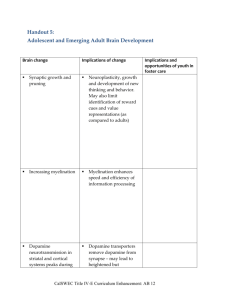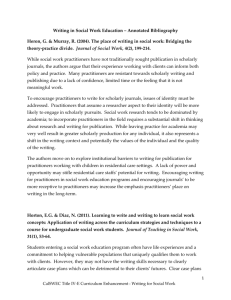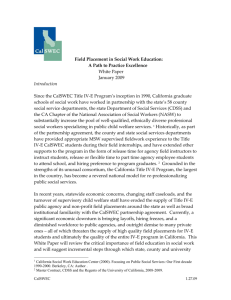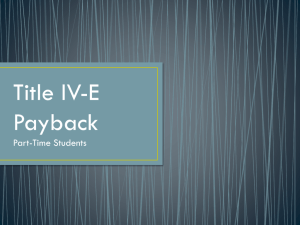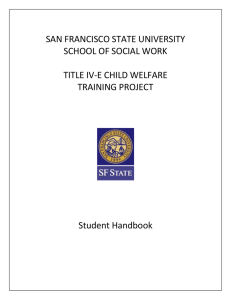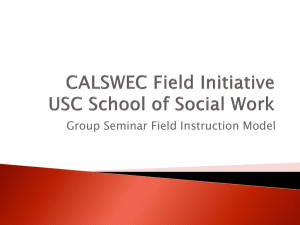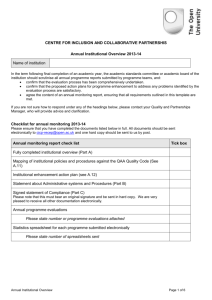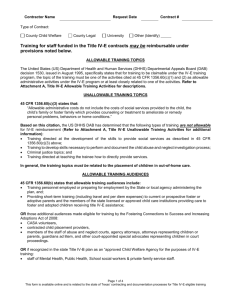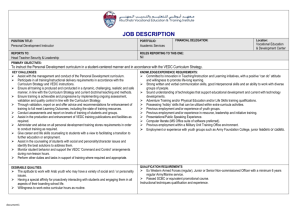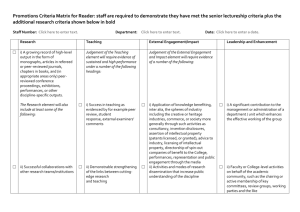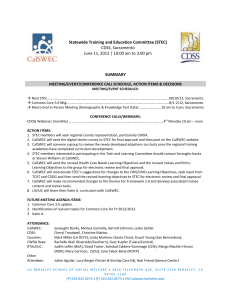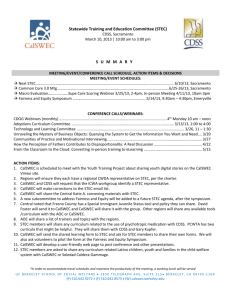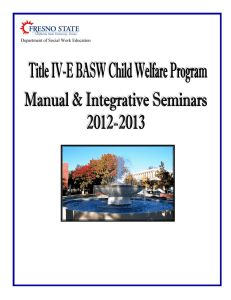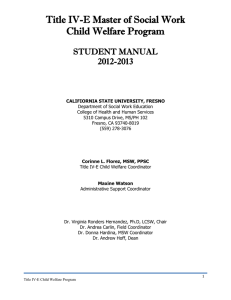State Practice Models Utilizing ECM Components
advertisement
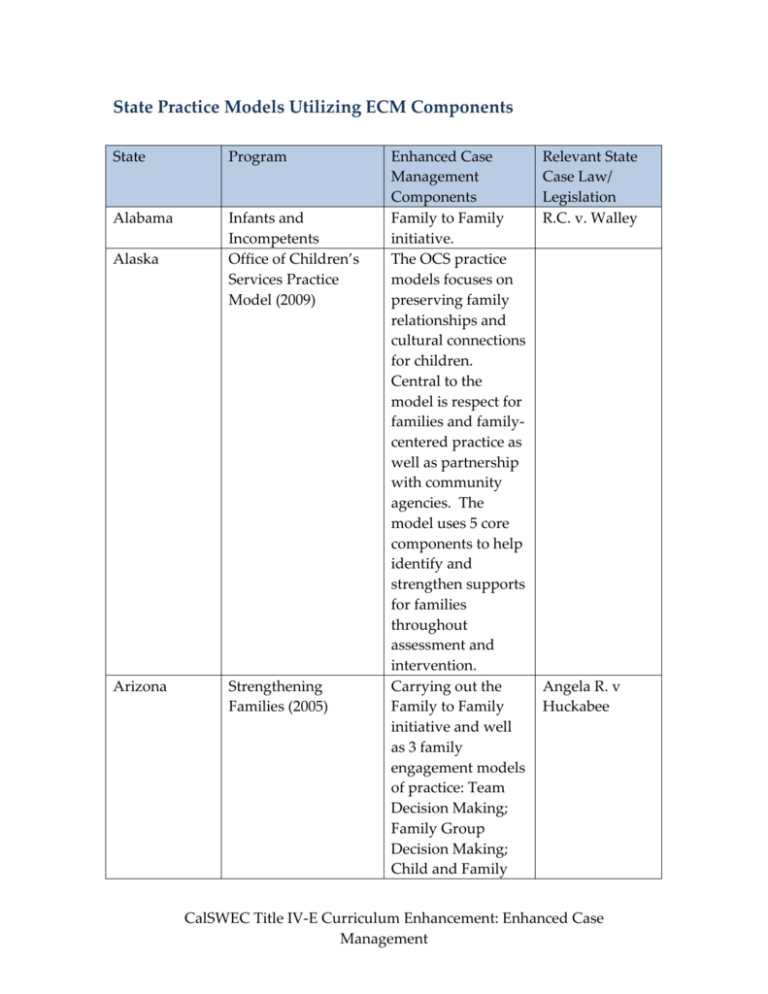
State Practice Models Utilizing ECM Components State Program Alabama Infants and Incompetents Office of Children’s Services Practice Model (2009) Alaska Arizona Strengthening Families (2005) Enhanced Case Management Components Family to Family initiative. The OCS practice models focuses on preserving family relationships and cultural connections for children. Central to the model is respect for families and familycentered practice as well as partnership with community agencies. The model uses 5 core components to help identify and strengthen supports for families throughout assessment and intervention. Carrying out the Family to Family initiative and well as 3 family engagement models of practice: Team Decision Making; Family Group Decision Making; Child and Family Relevant State Case Law/ Legislation R.C. v. Walley Angela R. v Huckabee CalSWEC Title IV-E Curriculum Enhancement: Enhanced Case Management State Program Arkansas Practice model California (2011 and onward) CA Partners for Permanency (CAPP) Practice Model Enhanced Case Management Components Teaming. The practice model helps systems work together to serve children and families. Goals and principles, aiming to achieve permanency, include shared problem solving and community involvement, continual skillbased training and consultation to improve practice, and accountability for outcomes. “How we work is as important as the work we do.” One of 6 programs in the US funded through a $100 million federal initiative to reduce long-term foster care. Over course of 5 years, CAPP will analyze county child welfare systems to find and address barriers to permanency. Is developing a child Relevant State Case Law/ Legislation Katie A v. Diana Bonita Higgins v. Saenz CalSWEC Title IV-E Curriculum Enhancement: Enhanced Case Management State Program Colorado Child Welfare Practice Model (2012) Connecticut Strengthening Families Delaware Florida None identified Family-Centered Practice Model (2009) Enhanced Case Management Components and family practice model to be used by social workers in partnership with families, tribes, & communities in meeting needs of children. Foci include strengthsbased engagement & respectful communication with families & community supports , honesty & trust, cultural sensitivity, and reduction of disproportionality. Core values include engaging families, collaborating with federal, state, local and tribal entities, culturally responsive practice and competent, professional & accountable staff. Family engagement and family-centered assessment Relevant State Case Law/ Legislation Juan F. v. Rell Emily J. v. Weicker Every child and family has intrinsic CalSWEC Title IV-E Curriculum Enhancement: Enhanced Case Management State Program Georgia Family Centered Case Practice Model (2009) Hawaii Family Partnership and Engagement Practice Model (2010) Enhanced Case Management Components worth and value; service plans developed with families; services effective, timely and well-coordinated; services individualized and flexible; families’ cultural and ethnic roots understood and embraced. Provide relevant services with respect for and understanding of culture; family engagement; development of individualized case plans. The model details day-to-day practice skills that enhance engagement, including respect, active listening and full disclosure of legal responsibilities. Families are to be engaged within the context of their culture. It is the responsibility of the worker to engage Relevant State Case Law/ Legislation Kenny A. v. Perdue Jennifer Felix v. Cayetano CalSWEC Title IV-E Curriculum Enhancement: Enhanced Case Management State Program Idaho None identified. Illinois None identified. Enhanced Case Management Components family members as active participants in case planning. Work in collaboration with communities to improve outcomes. Relevant State Case Law/ Legislation Oglala Sioux Tribe et al v. Harris B.H. v. McDonald Aristotle P. v. McDonald Bates. v. McDonald Burgos v. Suter Katie I. v. Kimbrough Indiana How are the Children in Indiana? (2010) Core training for staff includes engagement and teaming skills. Workers build trustbased relationships with families by exhibiting professionalism, empathy, genuineness and Hill v. Erickson B.M. v. Richardson CalSWEC Title IV-E Curriculum Enhancement: Enhanced Case Management State Program Iowa Child Welfare Model of Practice (2007) Kansas None identified. Kentucky Comprehensive Family Services Framework (2003) Louisiana Maine None identified. Child and Family Practice Model (2010) Enhanced Case Management Components respect. This practice model is founded on key values: listen respectfully, respond appropriately; communicate openly; collaborate with families, employees and public and private agencies; and be accountable for services provided. Excellence is achieved through efficient, effective and reasonable service. Relevant State Case Law/ Legislation Sheila A. v. Finney Families are equal partners; case plans driven by families’ goals. Look for strengths in families as well as in the Child Welfare organization. The work and learning environment should be supportive. CalSWEC Title IV-E Curriculum Enhancement: Enhanced Case Management State Program Maryland Place Matters Massachusetts Integrated Casework Practice Model (2012) Michigan MiTeam (2012) Enhanced Case Management Components This practice model represents a comprehensive reform strategy to achieve permanency. Datadriven and results oriented, the emphasis is placed on minimizing children’s time in foster care. The family is viewed as a partner in deciding where a child should be placed, with the goal of keeping children in their communities and with relatives whenever possible. Family-centered, strengths based, community connected, committed to cultural competence and diversity, committed to continuous learning and quality improvement Seeks to improve engagement by actively involving Relevant State Case Law/ Legislation L.J. v. Massinga 2009 – New group homes can only gain licensure if responding to a RFP. Committee to End Racism in Michigan’s CalSWEC Title IV-E Curriculum Enhancement: Enhanced Case Management State Program Minnesota Child Protection Program Logic Model for Supervisors (2009) Mississippi Child Welfare Practice Model (2010) Enhanced Case Management Components families as partners and through honest, transparent and non-judgmental interactions. Best practices identified: Identification of families’ strengths; clear expectations communicated to workers’ regarding thoroughness and accuracy of assessments; cultural competence; regular staff trainings; meetings timely and address family engagement; families’ basic needs addressed; partnership with support services; children and families involved in case planning. Relevant State Case Law/ Legislation Child Care System v. Mansour Budreau v. Hennepin County Welfare Board The practice model calls for developing case plans with and not for families. Central values: include all ‘relevant’ family members; be CalSWEC Title IV-E Curriculum Enhancement: Enhanced Case Management State Program Missouri Montana Nebraska Nevada None identified. None identified. None identified. Case Management Practice Model (2005) New Hampshire None identified. New Jersey Case Practice Model (2007) Enhanced Case Management Components flexible and change as family progresses; preserve and maintain connections, including tribal and cultural supports. Relevant State Case Law/ Legislation G.L. v. Stangler Founding principles: mutual respect and meaningful partnership between workers and families; interagency collaboration; cultural competence; accountability. Necessary caseworker skills include engagement, teaming, assessing, planning and adapting. Eric I. v. Bird Family engagement produces outcomes. Teaming, assessing, James O. v. Marston Charlie and Nadine H. v. Codey CalSWEC Title IV-E Curriculum Enhancement: Enhanced Case Management State Program New Mexico Pinon Practice Model New York Child Welfare Community’s Commitment to Quality Practice North Carolina North Dakota Wraparound Practice Model Enhanced Case Management Components planning, tracking and adjusting are the tools to engage. Strengths-based and culturally responsive services; organizational competence; engagement throughout process defined as looking at situation from child and family’s point of view, listening, identifying strengths and including them in case planning. Family to Family initiative. Cultural responsiveness, community partnership, organizational competence. Family centered principles of partnership Includes family engagement which is defined as including families at Relevant State Case Law/ Legislation Joseph and Josephine A. v. Bolson Marisol v. Pataki Wilder v. Bernstein Nicholson v. Williams Willie M. et al v. Hunt CalSWEC Title IV-E Curriculum Enhancement: Enhanced Case Management State Program Ohio Oklahoma None identified. Pinnacle Plan Oregon System of Care Pennsylvania None identified. Rhode Island None identified South Carolina South Dakota Tennessee None identified None identified Standards of Professional Practice for Serving Children and Families (2003) Texas Utah None identified Our Practice Models (2011) Enhanced Case Management Components every opportunity and community partnership. Relevant State Case Law/ Legislation Roe v. Staples Engage community partners and minimize staff turnover. Strengths-based; views families as part of solution, not the problem; individualized services; collaborative model Baby Neal v. Ridge Office of the Child Advocate v. Lindgren Workers use engagement, strengths-based approaches and team decision making to engage and empower families. Brian A. v. Sundquist Guiding principles: families need consistent nurturing to develop to full David C. v. Leavitt CalSWEC Title IV-E Curriculum Enhancement: Enhanced Case Management State Program Vermont Family Services Practice Model (2011) Virginia Children Services Practice Model (2009) Washington Family-Centered Practice Model (2004) Enhanced Case Management Components potential; cultural responsiveness; engagement and teaming; community partnership; organizational and professional competence. Early engagement of the larger family relationship is the key to success; engaged relationships hold the promise for sustained change; respect for cultural, ethnic and spiritual diversity. Open communication, accountability and transparency at all levels of the system and across all agencies. Engage stakeholders and community partners. There is an intrinsic value and worth to every family. Families can best solve problems by building on Relevant State Case Law/ Legislation Braam v. DSHS CalSWEC Title IV-E Curriculum Enhancement: Enhanced Case Management State Program West Virginia None identified Wisconsin Practice Model Initiative (2011) Wyoming None identified. Enhanced Case Relevant State Management Case Law/ Components Legislation strengths. Cultural heritage and traditions are part of families’ identities and must be respected. Appropriate resources to address families’ needs must be provided in a timely fashion. Gibon v. Ginsberg Families, Jeanine B. v. communities and McCallum the child welfare system work together as partners to benefit children. Respectful interaction includes educating parents on the child welfare process, listening and actively involving them. Cultural competence achieved through diverse, professionallycompetent workers. CalSWEC Title IV-E Curriculum Enhancement: Enhanced Case Management
